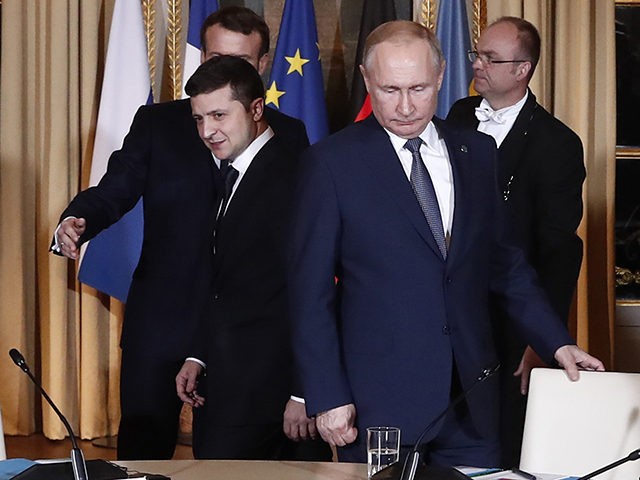Russian President Vladimir Putin and Ukrainian President Volodymyr Zelensky met in Paris on Monday in an attempt to restart stalled peace talks on the war in eastern Ukraine, where Russian-backed separatist forces have been waging a deadly insurgency for the past five years.
The Russian and Ukrainian heads of state have not met in person since 2016 — the year in which Russian, Ukrainian, and American politics became entwined to a very uncomfortable degree. Zelensky took office in May.
Radio Free Europe on Sunday laid out the core reasons for the diplomatic deadlock, particularly Russia’s ongoing and transparently absurd pretense that it has nothing to do with the insurgency and is merely stepping in as a good neighbor to speak for the ethnic Russian population of restless eastern Ukraine:
Moscow denies direct involvement in the conflict between separatist formations in parts of eastern Ukraine and the Kyiv government, although Russia provides military, economic, and political support to the separatists and there has been substantial evidence of Russia’s direct military involvement.
The International Criminal Court (ICC) ruled in November 2016 that the war in eastern Ukraine was “an international armed conflict between Ukraine and the Russian Federation.”
All sides have made efforts to moderate expectations of a breakthrough in the run-up to the summit. The Kremlin wants to maintain as much influence over Kyiv as it can, using the land held by the separatists it supports in the Donbas as a lever. The Ukrainian president must balance the benefits of progress toward peace with the potentially disastrous risk of being seen as surrendering to Moscow.
Russian Foreign Minister Sergei Lavrov said on December 6 in Rome that Moscow expects “additional agreements that will help eliminate this conflict.”
He added that Moscow was seeking “to really ensure the security of the people of the Donbas, to guarantee their rights as set forth in the Minsk agreements, and to stop this conflict.”
Many Ukrainians are wary of making deals with the Russians, granting concessions to the separatists, or allowing elections in the Donbas region unless disarmament and withdrawal of Russian forces occur first. Kyiv is hoping to work out a deal that would give more authority to eastern officials without fragmenting Ukraine.
If that doesn’t work, Plan B reportedly includes proposals for building a physical wall along the border to keep Russian forces out of eastern Ukraine, a move that would dramatically escalate the Kyiv-Moscow diplomatic crisis.
Zelensky expressed optimism that he could negotiate a cease-fire and disarmament in the Donbas region, his two primary short-term objectives, but his predecessor, Petro Poroshenko, issued a public warning over the weekend that Putin cannot be trusted and will never honor the de-escalation spirit of the Minsk accords.
Zelensky sought to assuage fears Putin would take advantage of his inexperience — he was a professional comedian and actor before unseating Poroshenko in the last election, famous in Ukraine for starring in a TV show about a regular guy who stumbles into the presidency — by comparing the past five years of deadlock to running on a treadmill.
“You’re losing calories, but you’re stuck in the same place,” the Ukrainian president explained while running on an actual treadmill to illustrate his point.
Zelensky argued the Paris meeting is a significant accomplishment in its own right, pointing to the recent release of Ukrainian prisoners by Russia as a “signal that Russia is ready to talk.”
More cynical observers suspect Putin will use the Paris conference to ratify Russia’s annexation of the Crimean peninsula, establishing the annexation as an accepted fact on the ground in both Kyiv and European capitals, while pushing for Donbas to become much more independent — and therefore more firmly in Moscow’s orbit — than Kyiv wants it to be.
Foreign policy analysts widely expect Putin to take advantage of Ukraine’s low ebb of support from the United States (where all things related to Ukraine and Russia are currently the hottest of political hot potatoes) and Europe (which wants to do business with Russia and has little appetite for involvement in the Donbas situation).
There will be enormous pressure on Zelensky to take steps toward resolving the crisis in eastern Ukraine and come home with something to prove Putin takes him seriously as a national leader, but his domestic political opponents — and a sizable portion of the Ukrainian public — are making it clear he does not have great latitude to make concessions to Moscow.
Thousands attended a rally in Kyiv on Sunday to tell Zelensky they will never accept a bargain with Russia that compromises Ukrainian sovereignty. Opposition politicians rejected “peace at the cost of capitulation” and expressed grave misgivings about Putin’s willingness to deal honestly.
“We are here so that the voice from Kiev can be heard in Paris. Friends, we cannot make any concessions to Putin until the last sliver of Ukrainian land is free,” Poroshenko said at the rally.

COMMENTS
Please let us know if you're having issues with commenting.